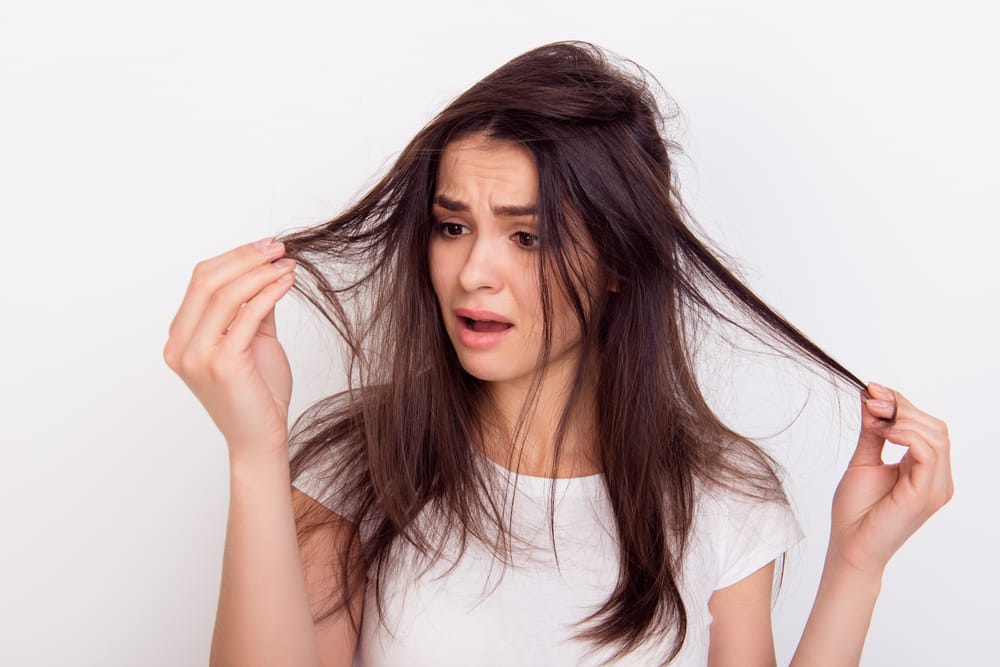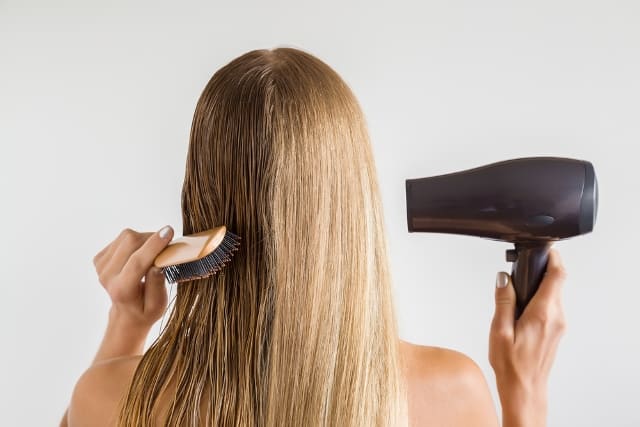Note 7 types of shampoo 'wash' to cure disease
Modern life is indeed very busy, many people often can only take advantage of a bath after a long working day. However, if the hair is not dry yet, but going to bed is equivalent to 'damaging' your hair, moreover, there may be many health problems.

Washing your hair improperly can cause you to 'wash' the disease.
1. Going to bed with wet hair
Many people, due to busy work, often wash their hair after 10 pm. After a long day of hard work, they hugged their wet hair and went to sleep. However, when the hair is wet, the cuticle opens, the hair is very fragile, so it will not withstand friction and easily makes the hair dry.
In addition, our grandparents often remind us that going to bed with wet hair will cause headaches in old age. This statement has been confirmed by modern scientific studies.
During metabolism, the human body constantly generates heat to maintain body temperature. This heat is also transferred to the surface of the body through the blood circulation system, and is continuously released to the outside through radiation, conduction, convection and evaporation.
People have strong resistance, their body temperature regulation function is normal, the two processes of heat generation and heat dissipation are balanced. This means that as body temperature tends to drop, heat production increases and heat dissipation decreases, so that body temperature is maintained at around 37°C. However, for people with weak resistance, the ability to automatically regulate body temperature and maintain normal body temperature is quite poor, so when infected with a cold, the whole body or a certain part is very susceptible to colds. cold.
When you wash your hair with warm water, the capillaries on the scalp will expand, and the heat from the body radiates around. At the same time, a large amount of water evaporates causing a lot of heat to be lost. Normally, 500 calories are lost when 1 gram of water evaporates.
Due to the increased heat loss, the human body is cooled, reflexively, the capillaries of the upper respiratory tract are constricted, local blood flow is reduced, and the resistance of the upper respiratory tract is reduced. This allows the virus or bacteria to take advantage of the environment to grow and multiply. Viruses can cause upper respiratory infections, leading to cold symptoms such as runny nose, stuffy nose, headache, and even fever. If you fall asleep with your hair still not dry, at this time, the regulation function of the thermoregulatory center is poor, and it is easy to catch a cold.

If you want to wash your hair late at night, dry your hair with a hair dryer before going to bed.
Recommendation: It is best not to wash your hair before going to bed. If you want to wash, you can dry your hair with a towel first, then dry your hair with a hair dryer before going to bed. Take care to do this to prevent you from catching a cold.
2. Use your nails to scratch your scalp
Nails are home to a lot of bacteria, but many people like to use their nails to scratch or rub vigorously on the scalp to 'already' itchy or feel cleaner. However, once the delicate scalp is scratched, it is very easy to become infected with the hair and scalp. In addition, this can also make hair greasy by stimulating the sebaceous glands to secrete oil.

Scratching the scalp with fingernails can cause infection.
Rubbing the hair vigorously when shampooing can make hair fall out and irritate the scalp, especially in cases where the scalp is thin or in the period of hair loss.
Recommendation: You should use your fingertips to gently massage the scalp from front to back and vice versa many times to remove dirt and help blood circulation better.
3. Apply conditioner directly to the hair roots
Conditioners have a nourishing effect on the hair to help smooth and frizz-free hair, but they are not used to care for the scalp. When shampooing, the hair follicles are opened, chemicals in the conditioner can easily penetrate and clog the hair follicles.
Recommendation: You just need to massage the conditioner from the hair shaft (about from the ears) down to the ends of the hair and remember not to let the conditioner come into contact with the scalp. After that, leave it on for about 2 minutes and then rinse it off with water.
4. Wash your hair without combing it
Before shampooing, you should brush your hair with a comb that has been moistened with water, to pull the dirt and dust on the scalp to the top, so that you can wash both the scalp and hair.
Recommendation: To avoid damaging the scalp, you should use a wide-toothed, round-headed comb.

Use a wide-tooth comb, moistened round head to brush your hair before shampooing, causing dirt and dust on the scalp to rise to the top, helping to wash both hair and scalp.
5. Tie your hair while it's wet
One of the most common mistakes made after washing your hair is tying your hair while it is still wet. This action makes the hair take a long time to dry, which can cause problems such as dandruff, itchy scalp… In addition, tying wet hair can also damage hair and split ends.
Recommendation: If you need to tie your hair, you should only tie it loosely so that the air can circulate through the hair, allowing the hair to breathe and dry faster.
6. Go outside right after you wash your hair
Studies have found that the amount of UV radiation that hair receives is twice as much as facial skin, ultraviolet rays cause the cuticle to thin and peel off. If you go out immediately after washing your hair, ultraviolet rays make your hair prone to breakage and split ends.
Recommendation: If you need to go outside, it is best to use an umbrella or hat to block UV rays, protect your hair.
7. Wash your hair too often during the week or use shampoo multiple times in each wash

Using too much shampoo can lead to hair loss.
The use of shampoo helps to clean the dirt and plaque on the scalp. However, using shampoo repeatedly is like using bleach to remove all the oil from the scalp, leaving the scalp and hair dry.
Experts also advise against washing your hair too often. Because frequent washing will strip the natural oils secreted by the scalp. When the scalp is out of balance, it prevents new hair from growing, makes your hair more fragile and can lead to hair loss. Moreover, washing your hair too often will cause the scalp to produce more oil to rehydrate, which in turn makes the hair look even greasy.
Recommendation: Only using one shampoo per wash is enough. In addition, each person should choose the number of shampoos per week depending on the type of hair, as well as the season and activity space. On average, once every 2-3 days is enough. However, people with oily hair, especially in the summer, produce a lot of oil, it's best to wash your hair daily to make sure your hair is clean.
- The unknown truth about shampoo
- You will no longer abuse dry shampoo after reading this article
- Is daily shampoo good?
- Why avoid 2 in 1 shampoo?
- Simple way to wash nasal respiratory disease
- Silver hair anti-shampoo shampoo
- Is the cure for HIV coming soon?
- Are you washing your hair the right way or killing your hair?
- How to wash clean parasitic vegetables and chemicals
- Shampoo from shrimp shells decomposed
- Cow urine shampoo
- Experiments show that you are washing your hands extremely 'dirty'
 13 causes of non-itchy rash
13 causes of non-itchy rash How the mouse with human ears changed the world?
How the mouse with human ears changed the world? The truth about 'fried rice syndrome!
The truth about 'fried rice syndrome! What is dental implant?
What is dental implant?